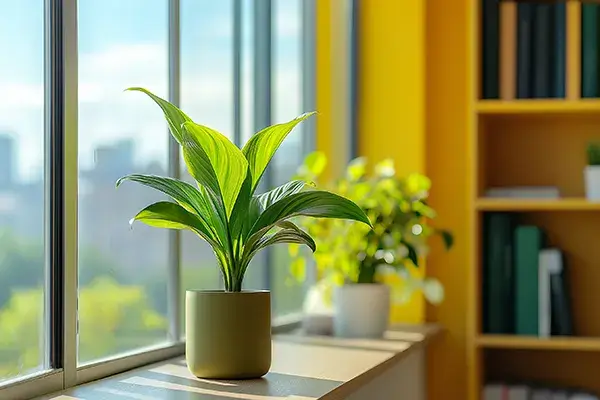Are you looking to breathe new life into your workspace? Adding positive energy plants to your office can transform it into a vibrant and productive environment. These green companions not only purify the air but also boost your mood and creativity.
From the low-maintenance snake plant to the cheerful sunflower, there's a perfect plant for every desk and corner. You'll discover how these natural wonders can reduce stress, increase focus, and create a more inviting atmosphere for both you and your colleagues. Ready to harness the power of nature in your professional life? Let's explore the top positive energy plants that'll turn your office into a thriving oasis.
Benefits of Positive Energy Plants in the Office
Positive energy plants in your office offer substantial advantages beyond aesthetics. They boost productivity by 15%, enhancing focus and attention restoration. These natural elements significantly reduce stress, with studies showing a 37% drop in anxiety, 58% decrease in depression, and 44% reduction in anger among employees. Plants create a healthier workspace, purifying the air and promoting overall well-being. By incorporating these green companions, you'll transform your office into a more vibrant, productive, and stress-free environment.
Top Office-Friendly Plants for Positive Energy
Discover the best plants to elevate your office environment and boost positive energy. These low-maintenance options not only purify the air but also enhance your workspace's aesthetic appeal.
Snake Plant
Snake Plants, scientifically known as Sansevieria trifasciata, are excellent air purifiers. They absorb particulate matter and volatile organic compounds (VOCs), creating a healthier atmosphere. Their vibrant colour attracts positive energy, and they're incredibly low-maintenance, thriving in various light conditions.
Peace Lily
Peace Lilies (Spathiphyllum) symbolise tranquillity in Feng Shui. They purify air, reduce headaches, and boost mental health. These adaptable plants grow well in low light, making them perfect for offices. They prefer well-draining soil and moderate watering, requiring minimal care.
Spider Plant
Spider Plants (Chlorophytum comosum) are natural air purifiers, removing formaldehyde and xylene. They're known for their stress-reducing properties and ability to boost productivity. These hardy plants thrive in indirect light and are easy to propagate, making them ideal for sharing positive energy throughout the office.
Bamboo Palm
Bamboo Palms (Chamaedorea seifrizii) excel at humidifying dry office air. They're effective at removing indoor air pollutants, particularly benzene and trichloroethylene. These palms thrive in low to moderate light, making them versatile for various office settings. Their lush foliage adds a tropical touch to your workspace.
Creating a Green Office Environment
Transform your workspace into a vibrant, energy-boosting oasis with carefully selected plants. Here's how to create an optimal green office environment:
Choosing the Right Locations
Place plants strategically to maximise their impact. Position larger plants in corners or near windows to create focal points. Arrange smaller plants on desks or shelves to bring nature closer to workspaces. Consider light requirements and available space when selecting plant locations.
Proper Care and Maintenance
Establish a regular care routine to keep your office plants thriving. Water plants according to their specific needs, typically when the top inch of soil feels dry. Dust leaves monthly to promote photosynthesis. Prune periodically to maintain shape and encourage healthy growth. Fertilise sparingly during growing seasons for optimal plant health.
The Impact of Plants on Workplace Productivity
Plants in the office don't just look nice; they're productivity powerhouses. Studies show they can boost productivity by 15% and significantly reduce stress levels. Snake Plants, Peace Lilies, and Aloe Vera purify the air, reducing headaches and respiratory issues. These green colleagues also create a calming atmosphere, with research indicating a 37% reduction in anxiety, 58% decrease in depression, and 44% reduction in anger among employees. By improving air quality and mental well-being, office plants contribute to a healthier, more productive work environment.
Incorporating Feng Shui Principles with Office Plants
Feng Shui principles can enhance your office's energy flow when applied to plant selection and placement. Three plants highly recommended for their positive energy and low maintenance are the Jade Plant, Money Tree Plant, and Lucky Bamboo. These plants not only improve air quality but also symbolise good fortune and prosperity. By strategically positioning these plants in your workspace, you'll create a harmonious environment that promotes productivity and reduces stress.
Conclusion
Incorporating positive energy plants in your office space offers numerous benefits. From air purification to stress reduction, these green additions create a healthier, more productive environment. Choose low-maintenance options like snake plants, peace lilies, or spider plants for easy care. Place them strategically to maximise their impact and follow proper maintenance routines. By embracing these natural elements, you'll transform your workspace into a vibrant, energising oasis that promotes well-being and productivity.
Key Takeaways
- Positive energy plants boost office productivity by 15% and significantly reduce stress levels
- Snake Plants, Peace Lilies, and Spider Plants are top low-maintenance options for purifying air and enhancing workspace aesthetics
- Strategic plant placement and proper care routines are crucial for creating an optimal green office environment
- Office plants contribute to a 37% reduction in anxiety, 58% decrease in depression, and 44% reduction in anger among employees
- Incorporating Feng Shui principles with plants like Jade Plant and Lucky Bamboo can enhance positive energy flow in the workspace
- Adding plants to your office creates a healthier, more productive environment that promotes well-being and creativity
Frequently Asked Questions
What are positive energy plants?
Positive energy plants are specific types of indoor plants believed to enhance mood, reduce stress, and improve overall well-being. These plants are known for their air-purifying qualities, ability to boost creativity, and capacity to create a more vibrant atmosphere in office spaces. Examples include Snake Plants, Peace Lilies, Spider Plants, and Bamboo Palms.
How do plants increase office productivity?
Plants increase office productivity by purifying the air, reducing stress levels, and improving focus. Studies have shown that incorporating plants in the workspace can boost productivity by up to 15%. They also help reduce anxiety by 37%, depression by 58%, and anger by 44% among employees, creating a more positive and efficient work environment.
Which plants are best for low-light office spaces?
Peace Lilies (Spathiphyllum) are excellent choices for low-light office spaces. They thrive in areas with minimal natural light and still manage to purify the air effectively. Snake Plants (Sansevieria trifasciata) are also well-suited for low-light conditions and require minimal maintenance, making them ideal for offices with limited natural light.
How often should office plants be watered?
The watering frequency for office plants depends on the specific plant type and environmental conditions. Generally, most office plants should be watered once the top inch of soil feels dry. Establish a regular watering routine, typically once or twice a week, and adjust based on each plant's needs. Avoid overwatering, as this can lead to root rot.
Can plants help reduce stress in the workplace?
Yes, plants can significantly reduce stress in the workplace. They create a calming atmosphere and help employees feel more connected to nature. Spider Plants, in particular, are known for their stress-reducing properties. The presence of plants has been shown to lower cortisol levels, decrease blood pressure, and improve overall mental well-being in office environments.
How do plants improve air quality in offices?
Plants improve air quality by absorbing carbon dioxide and releasing oxygen through photosynthesis. They also filter out harmful pollutants and volatile organic compounds (VOCs) commonly found in office environments. Plants like the Bamboo Palm are particularly effective at humidifying dry air and removing indoor pollutants, creating a healthier breathing environment for employees.
What are some low-maintenance plants for busy offices?
Low-maintenance plants ideal for busy offices include Snake Plants, Spider Plants, and Lucky Bamboo. These plants require minimal care, can tolerate various light conditions, and are resistant to pests. Jade Plants and Money Tree Plants are also excellent low-maintenance options that symbolise good fortune and prosperity according to Feng Shui principles.
How can plants be incorporated into office design?
Incorporate plants into office design by placing larger plants in corners or near windows to create focal points. Arrange smaller plants on desks or shelves to add greenery at eye level. Use hanging plants to maximise vertical space. Consider creating a living wall or green dividers between workstations. Ensure plants are positioned to receive appropriate light and don't obstruct walkways.
What are the benefits of using Feng Shui plants in the office?
Feng Shui plants in the office are believed to enhance energy flow, promote good fortune, and create a harmonious work environment. Plants like the Jade Plant, Money Tree Plant, and Lucky Bamboo are thought to symbolise prosperity and success. These plants not only improve air quality but also contribute to a positive atmosphere, potentially boosting morale and productivity.
How do you maintain office plants?
Maintain office plants by establishing a regular care routine. This includes watering when the top inch of soil is dry, dusting leaves to keep them clean and healthy, pruning dead or yellowing leaves, and fertilising during the growing season. Ensure plants receive appropriate light and rotate them occasionally for even growth. Monitor for signs of pests or disease and address issues promptly.

